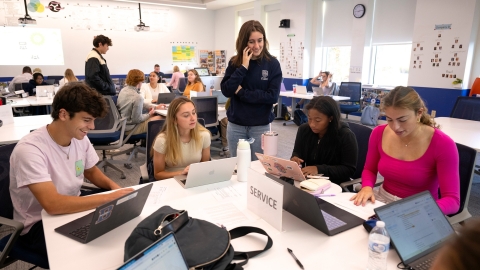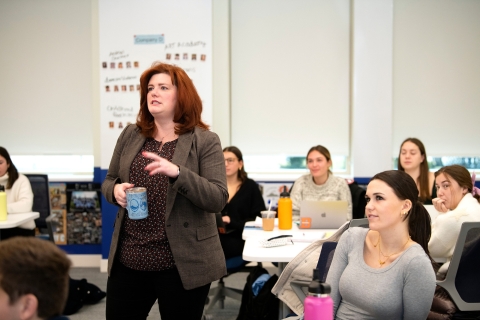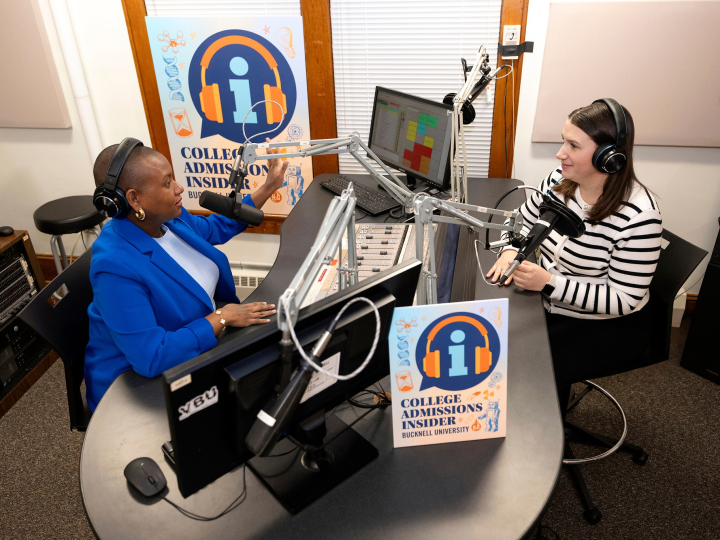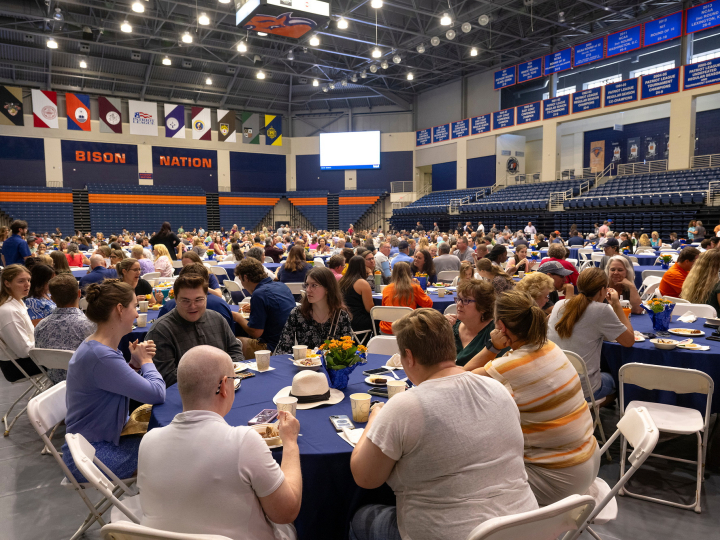
A Foundation for Innovation: 45 Years of Management 101
June 27, 2025
MGMT 101 students brainstorm ideas for their service-learning project. Photo by Emily Paine, Marketing & Communications
In the Freeman College of Management, students chart a course that encourages them to embrace new challenges, develop teamwork and leadership skills, and test big ideas that can have lasting impacts far beyond the classroom. And it all begins with Management 101.
Now in its 45th year, Management 101 once looked very different from the hallmark course it is today. "It started out as a standard lecture course housed in the College of Arts & Sciences," says John Miller, emeritus professor of management, who taught the course for more than three decades. "Faculty stood on stage in what is now Trout Auditorium and basically lectured to a couple hundred students at a time."
What Miller and his colleagues recognized right away was that Management 101 required a novel approach. "The first thing that I had to do was redefine what the field of management was," he says.
In his experience, management often got conflated with business, which had the effect of narrowing the relevance of a discipline that was integral to all fields, whether health care, education, government or nonprofits. "This course had to introduce management in its most general sense, because management is not just about business — it's essential to all organizations," he says.
Miller conceived of Management 101 as an experiential learning laboratory where students would be introduced to the key tenets of management and organizations by running their own businesses and service learning projects — components that still undergird the course over four decades later.
"Students are essentially forming a social enterprise," says Professor Melissa Intindola, management & organizations. "They make their own companies and create a product that they sell to facilitate a service project with selected, 501(c)(3) designated community partners."

Professor Melissa Intindola, management and organizations, leads a MGMT 101 class in the Elfers Family Management 101 Classroom. Photo by Emily Paine, Marketing & Communications
Students not only create the products they intend to sell; they have the autonomy to design their company's organizational structures.
"We decided to organize an executive team rather than having a single CEO because our class was filled with strong leaders," says Sienna Mandry '28, whose role was vice president of service. "We believed a shared leadership structure would be more effective." Mandry and her team sold crewneck sweatshirts to support the Getting Ahead Foundation, which includes improving community spaces at the Milton Lutheran Church and Milton Community Center.
While Management 101 has a strong framework, it remains adaptable and dynamic. Even after nearly half a century in operation, student-run companies can still encounter surprises and curveballs that test and reinforce their lessons in the classroom.
"We were actually nicknamed the Company of Pivots," says Alanna Noviello, a part-time management student who works as coordinator of people, success and operations within Bucknell's University Advancement. "The challenges we've faced have made us better communicators, and I think having a highly communicative executive team has helped us become a stronger company at all levels."
In Management 101, failures and setbacks are just as much a part of the learning process as achievements and successes. "Organizations put up barriers that you didn't sense were going to be there. You have to figure out how to work through them. You can't just throw your hands in the air and give up," says Intindola. "So it's a good exercise for students to learn how to pivot and adjust, because that's what they'll be doing in their careers and in their lives."
For Alex Nowlin '14, accounting, it was his experience in Management 101 that ended up exposing him to new career possibilities. "I was the CEO of my class company and we came up with Bucknell-branded apparel," says Nowlin, CEO of USCAPE, a 32-person apparel company that sells in roughly 900 retail locations across the United States, Canada, Puerto Rico and Canada. "That experience really opened my eyes to the fact that there was a lot of opportunity into the collegiate lifestyle space. Management 101 is a foundational course for anybody who wants to learn how to run a small business, how to bring a product to market, and how to believe in where you're going."

